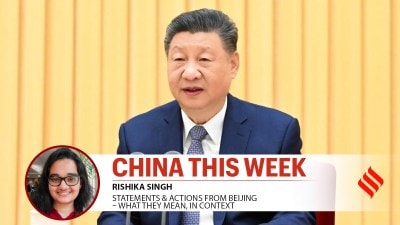A lesson from John McEnroe: Coming first is not the only way to achieve success
"Pressure to win makes the best of us cramp up...It is important to reconsider the idea of success that the rankings game has boxed us into," writes Nuggehalli.
 You will constantly ask yourself if you will end up second best or somewhere down the order. (Express photo)
You will constantly ask yourself if you will end up second best or somewhere down the order. (Express photo) (‘My dear students’, a fortnightly column that is a conversation with young minds on current events, books, popular culture — just about anything that’s worth talking over a cup of coffee.)
My dear students,
We are headed into convocation season, with many universities, including mine, holding graduation ceremonies for students stepping into the real world. In what has become a traditional concomitant, convocations have chief guests who address the outgoing students. In the United States, where these are called commencement speeches, the speech by the chief guest has become an art form in itself. Several have become instant classics, like the ones given by Steve Jobs and David Foster Wallace. A few weeks ago, John McEnroe gave a commencement speech at Stanford University. You should check it out. It mirrors his style of play, and his commentary. It’s combative, funny and unconventional. But when I heard it first, I also thought it was somewhat contradictory.
John McEnroe says that Björn Borg, his greatest rival in tennis, once told him, ‘If you’re not #1, it doesn’t matter if you’re #2 or #100.’ McEnroe says Borg got it wrong. When I hear elite sportsmen like McEnroe say that second best is also okay, I am tempted to roll my eyes a bit. I don’t think any top athlete really likes to come second. They are just not wired that way. McEnroe’s conduct during his tennis career contradicts his statements. He was intensely competitive. He would throw tantrums on the court if a borderline decision went against him. His life is not an example of someone who didn’t mind coming second. Then why did McEnroe disagree with Borg? A commencement speech requirement? To make sure that the non-valedictorians feel better? I judged McEnroe too harshly. His commencement speech, read as a whole, makes the case that over the long term, second best or any other result of one’s performance does not really matter.
He gives two different kinds of examples. He says that when he played the Wimbledon finals in 1980 against Borg, no one actually remembers the result (McEnroe lost). What people remember was that it was a great game played with uncommon skill and temperament. Two opponents who fed off each other gave it all and together elevated the game to tennis to a level not seen before. Most people remember McEnroe’s part in producing a wonderful exhibition of high quality tennis.Few believe today that McEnroe’s loss was the most important aspect of that match.
The second example McEnroe gives is about inspiration rather than entertainment. Nelson Mandela once told him that hearing the commentary on the same game gave him succour and satisfaction during the darkest days of his imprisonment. Hearing Mandela say this gave McEnroe a lot of satisfaction. I think McEnroe is using these examples to show that winning or coming first is not the only way to achieve success, except that one has to have some patience to understand this.
There is a nice coda to this. In the middle of his speech, McEnroe talks about Carlos Alcaraz, the Spanish tennis prodigy who won Wimbledon recently. At the French Open, Alcaraz cramped up and lost in the finals. McEnroe felt it was due to pressure, mental and physical. But he also thought that the French Open experience would be transformative for Alcaraz. “I thought this could be life-altering for him – he’s got to figure out a way to conquer pressure. And I think he will.” And he did. Two weeks after McEnroe’s commencement speech, Alcaraz played one of the most incredible tennis games to win over the reigning Wimbledon champion, Djokovic. He was aiming to win, of course, and without the motivation to win the championship, he would not played such incredible tennis. But Alcaraz will be remembered for his play and not for who won on that day.
Like Alcaraz, it’s a given that all of you will deal with pressure throughout your academic and professional lives, even if not on the scale required of elite sportspersons. Some of the pressure will come from your parents and your well wishers. When McEnroe asked his father “What would make you happy?”, his father replied “A college scholarship and playing for your country.” McEnroe told him, “Well, Dad, I’m 12. Could you back off for a few years?”
But most of the pressure on you will come from you. You will constantly ask yourself if you will end up second best or somewhere down the order. If you can take anything away from McEnroe’s speech it is the idea that success is not always about ranking; in fact, it might not be about rankings at all but about some other intangible things, like taking pleasure in creating something beautiful or valuable, and making other people happy. The only problem is at the present time, you might be tempted to, like the rest of us, focus on rankings. But try to shift your focus a little bit and take inspiration from McEnroe’s extortions. Pressure to win makes the best of us cramp up, and I think it is important to reconsider the idea of success that the rankings game has boxed us into.
- 01
- 02
- 03
- 04
- 05































